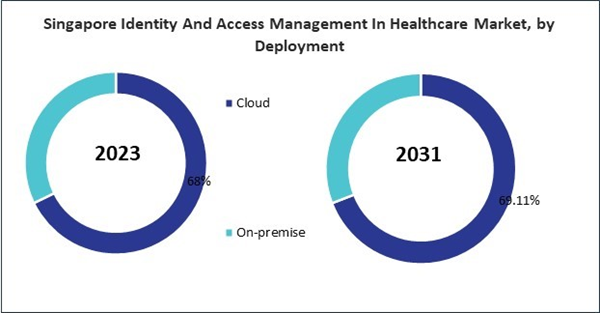The China market dominated the Asia Pacific Identity And Access Management In Healthcare Market by Country in 2023, and is expected to continue to be a dominant market till 2031; thereby, achieving a market value of $321.8 million by 2031. The Japan market is registering a CAGR of 17.4% during 2024-2031. Additionally, the India market is expected to obtain a CAGR of 18.8% during 2024-2031.
The adoption of identity and access management solutions in healthcare is influenced by several emerging trends that reflect the sector’s evolving needs and technological advancements. Healthcare organizations are shifting towards patient-centric solutions, driven by the need to provide seamless and secure access to patient data. IAM systems are increasingly being adopted to enhance patient experience by integrating with patient portals and mobile health applications, ensuring patients can access their health records, schedule appointments, and manage their care securely and efficiently.
Integrating IAM solutions with advanced health technologies such as artificial intelligence (AI) and the Internet of Things (IoT) is becoming more prevalent. AI-driven IAM systems help automate access controls and detect anomalies, while IoT integration ensures secure access to data from connected medical devices. This trend supports the growing complexity and connectivity of healthcare systems. Healthcare organizations are implementing IAM systems to facilitate secure remote access for clinicians, administrators, and support staff, ensuring they can access critical systems and data from various locations while maintaining robust security controls.
China’s expanding healthcare infrastructure involves integrating advanced health information systems, like EHRs and Health Information Exchanges (HIEs). IAM solutions are essential for managing secure access to these systems, ensuring that healthcare professionals across numerous facilities and consortia can efficiently and securely access patient data and health records.
The growth of healthcare infrastructure, including numerous new medical centers and consortia, requires scalable IAM solutions capable of accommodating large numbers of users and access points. As the healthcare network expands, IAM systems must scale to handle the increased volume of access requests and data management requirements, supporting the efficient operation of an ever-growing healthcare ecosystem.
With the establishment of over 18,000 medical consortia, ensuring the security of multi-site operations becomes crucial. IAM solutions help manage access across these diverse and geographically dispersed entities, protecting sensitive health information from unauthorized access and ensuring consistent security practices across all locations. In conclusion, the expansion of the healthcare infrastructure is driving the growth of the market.
List of Key Companies Profiled
- IBM Corporation
- Google LLC
- Cisco Systems, Inc.
- Oracle Corporation
- Broadcom, Inc.
- Amazon Web Services, Inc. (Amazon.com, Inc.)
- NEC Corporation
- Fortra, LLC (HGGC)
- Ping Identity Holding Corp. (Thoma Bravo, L.P.)
- Delinea Inc. (TPG Inc.)
Market Report Segmentation
By Component
- Software Solutions
- Services
By End User
- Hospitals and Clinics
- Healthcare Payers
- Life Science Companies
- Other End Users
By Deployment
- Cloud
- On-premise
By Type
- Provisioning
- Single Sign On (SSO)
- Multifactor Authentication
- Directory Service
- Audit and Compliance Management
By Country
- China
- Japan
- India
- South Korea
- Singapore
- Malaysia
- Rest of Asia Pacific
Table of Contents
Companies Mentioned
Some of the key companies profiled in this Asia-Pacific Identity and Access Management in Healthcare market report include:- IBM Corporation
- Google LLC
- Cisco Systems, Inc.
- Oracle Corporation
- Broadcom, Inc.
- Amazon Web Services, Inc. (Amazon.com, Inc.)
- NEC Corporation
- Fortra, LLC (HGGC)
- Ping Identity Holding Corp. (Thoma Bravo, L.P.)
- Delinea Inc. (TPG Inc.)









